Unit 2 What time do you go to school? Section A 教案(共三课时)
文档属性
| 名称 | Unit 2 What time do you go to school? Section A 教案(共三课时) |
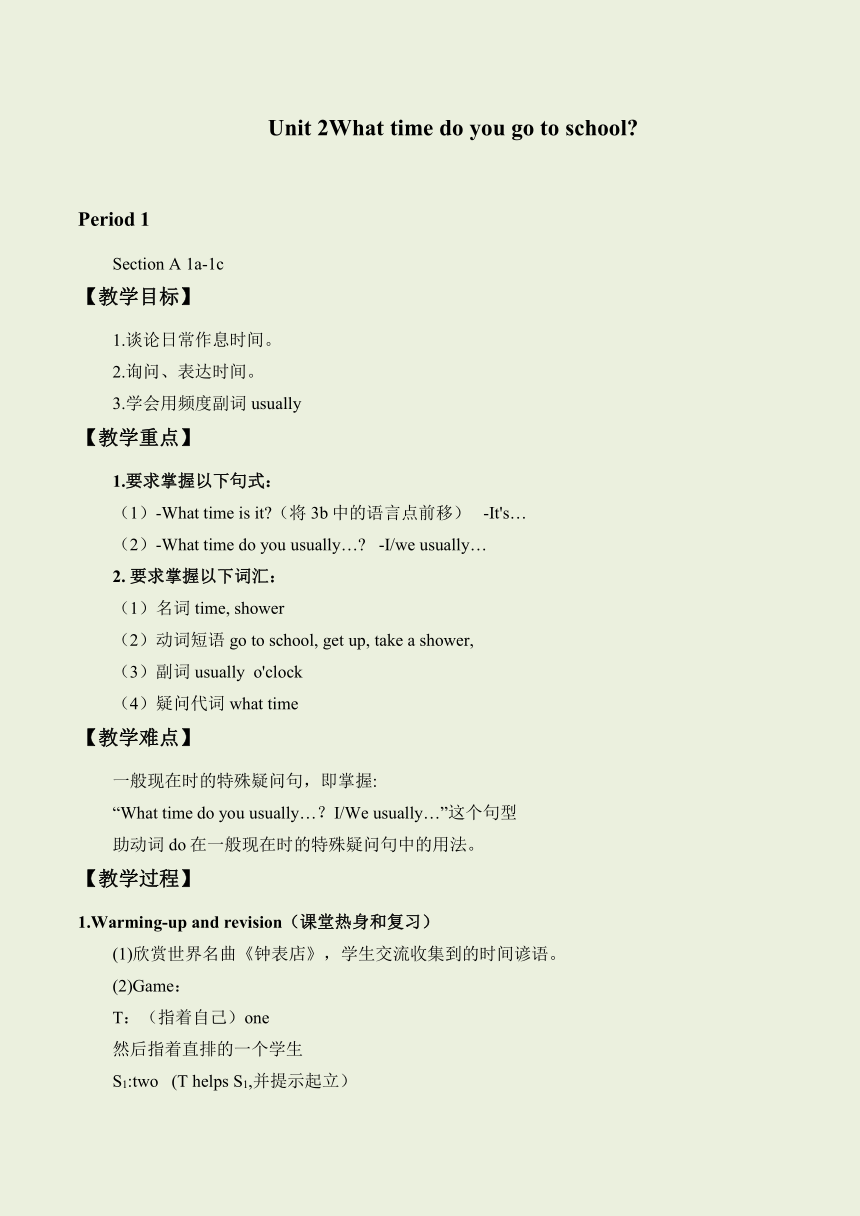
|
|
| 格式 | docx | ||
| 文件大小 | 202.4KB | ||
| 资源类型 | 教案 | ||
| 版本资源 | 人教新目标(Go for it)版 | ||
| 科目 | 英语 | ||
| 更新时间 | 2022-03-21 00:00:00 | ||
图片预览

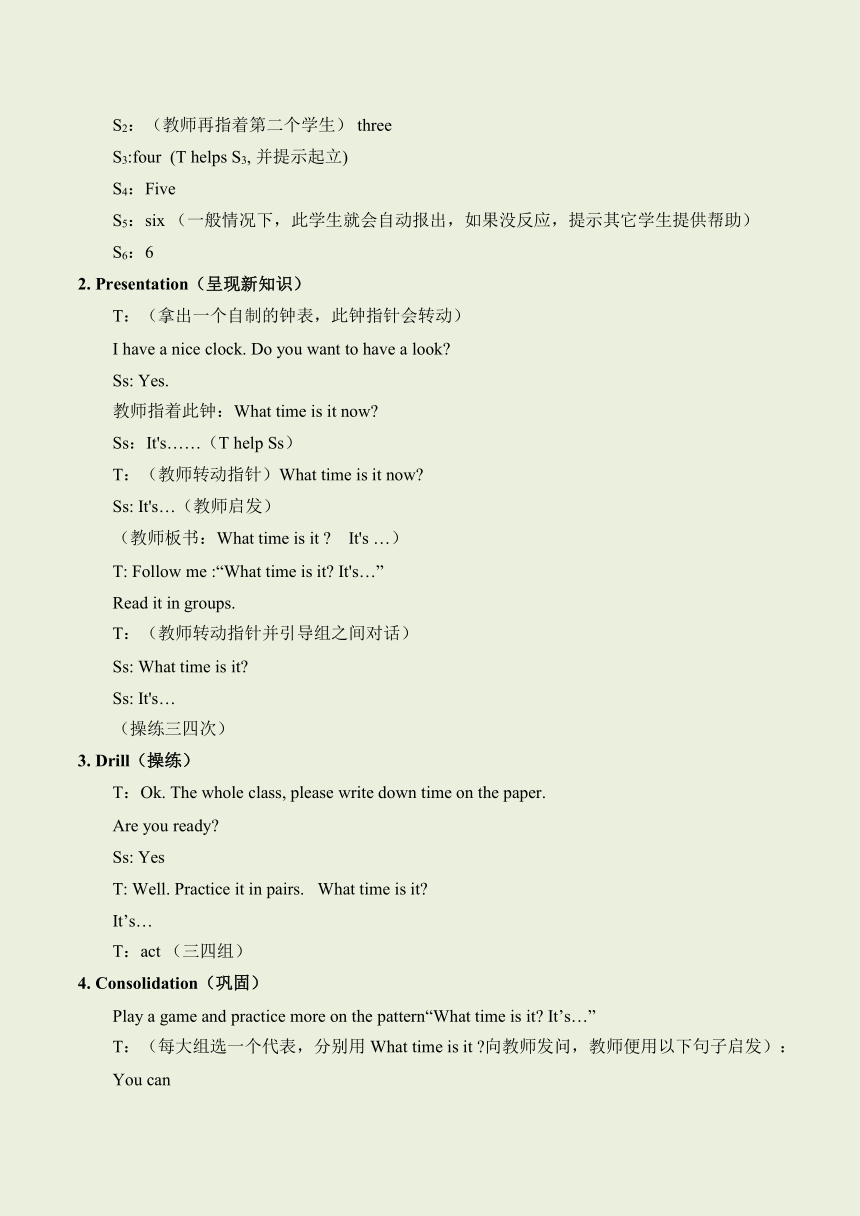
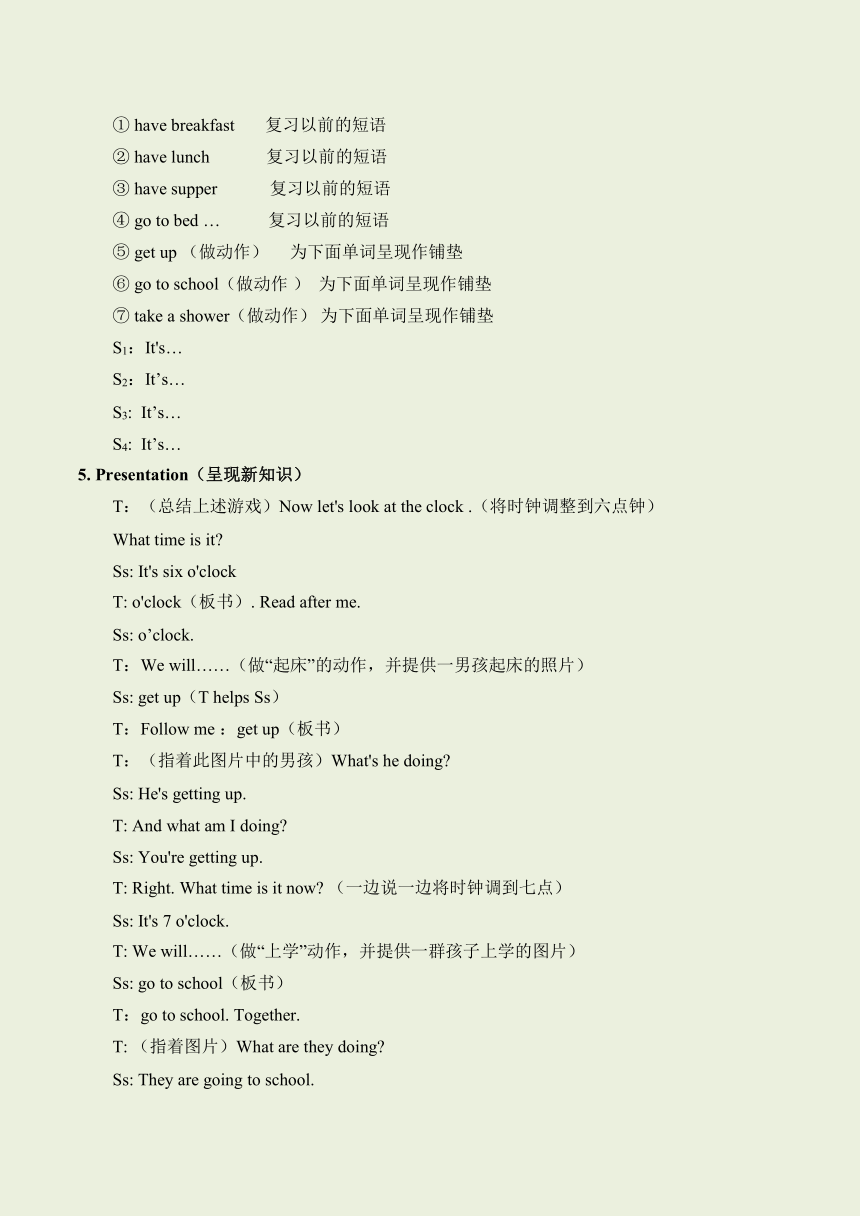
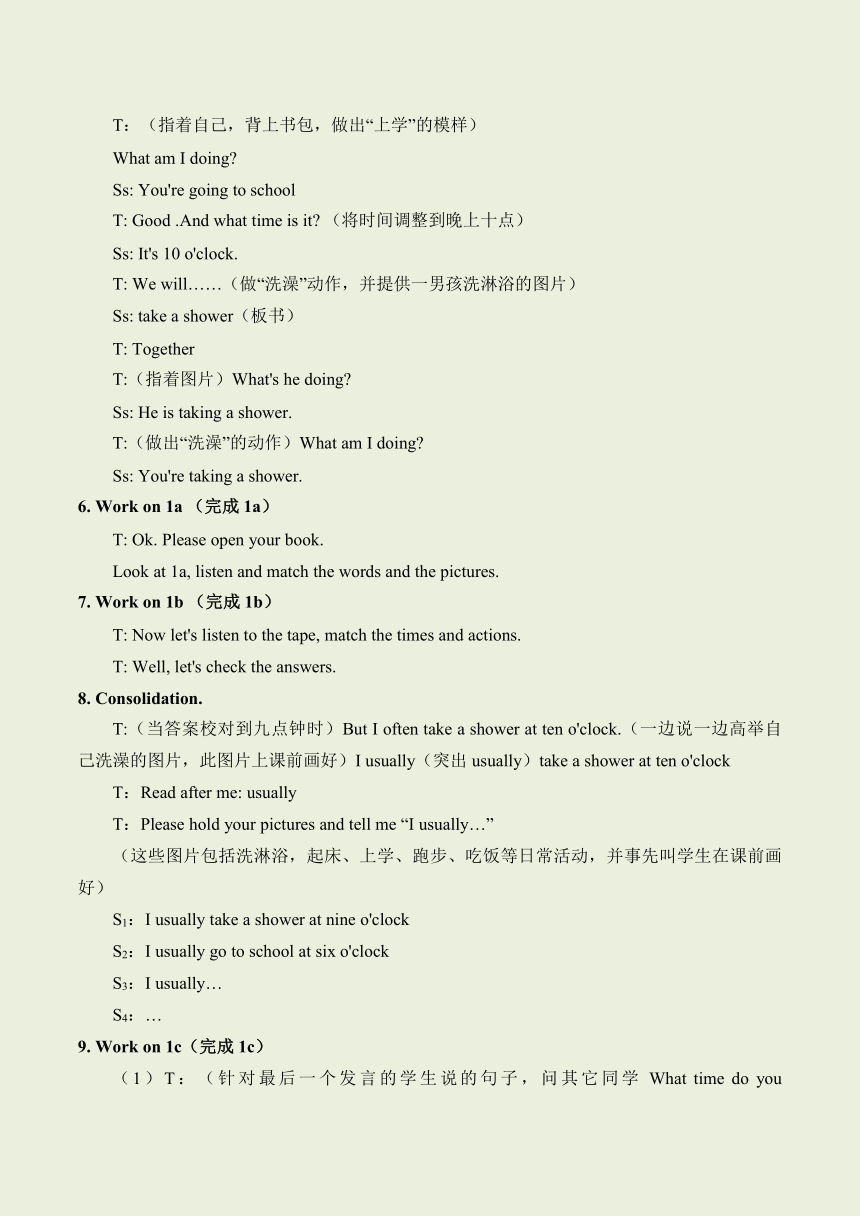
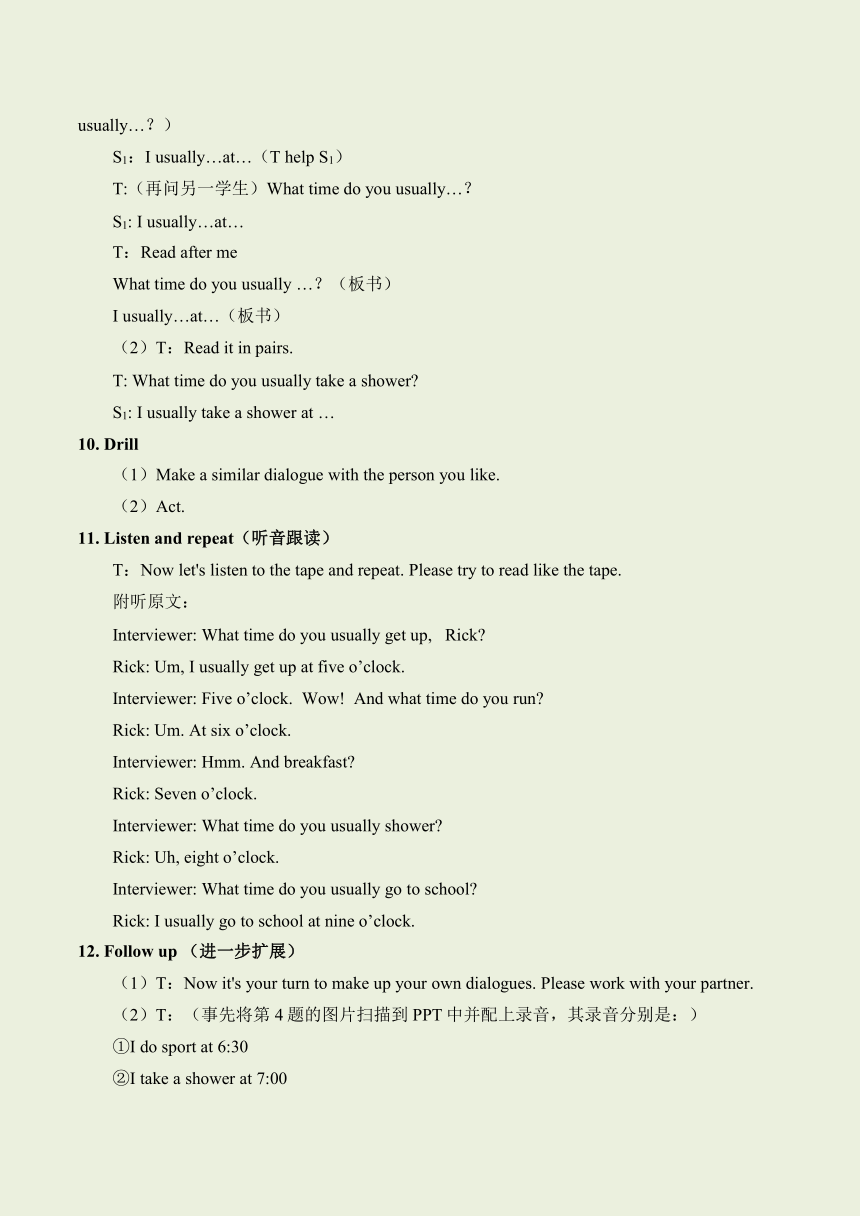
文档简介
Unit 2What time do you go to school
Period 1
Section A 1a-1c
【教学目标】
1.谈论日常作息时间。
2.询问、表达时间。
3.学会用频度副词usually
【教学重点】
1.要求掌握以下句式:
(1)-What time is it (将3b中的语言点前移) -It's…
(2)-What time do you usually… -I/we usually…
2. 要求掌握以下词汇:
(1)名词time, shower
(2)动词短语go to school, get up, take a shower,
(3)副词usually o'clock
(4)疑问代词what time
【教学难点】
一般现在时的特殊疑问句,即掌握:
“What time do you usually…?I/We usually…”这个句型
助动词do在一般现在时的特殊疑问句中的用法。
【教学过程】
1.Warming-up and revision(课堂热身和复习)
(1)欣赏世界名曲《钟表店》,学生交流收集到的时间谚语。
(2)Game:
T:(指着自己)one
然后指着直排的一个学生
S1:two (T helps S1,并提示起立)
S2:(教师再指着第二个学生) three
S3:four (T helps S3, 并提示起立)
S4:Five
S5:six (一般情况下,此学生就会自动报出,如果没反应,提示其它学生提供帮助)
S6:6
2. Presentation(呈现新知识)
T:(拿出一个自制的钟表,此钟指针会转动)
I have a nice clock. Do you want to have a look
Ss: Yes.
教师指着此钟:What time is it now
Ss:It's……(T help Ss)
T:(教师转动指针)What time is it now
Ss: It's…(教师启发)
(教师板书:What time is it It's …)
T: Follow me :“What time is it It's…”
Read it in groups.
T:(教师转动指针并引导组之间对话)
Ss: What time is it
Ss: It's…
(操练三四次)
3. Drill(操练)
T:Ok. The whole class, please write down time on the paper.
Are you ready
Ss: Yes
T: Well. Practice it in pairs. What time is it
It’s…
T:act (三四组)
4. Consolidation(巩固)
Play a game and practice more on the pattern“What time is it It’s…”
T:(每大组选一个代表,分别用What time is it 向教师发问,教师便用以下句子启发):
You can
① have breakfast 复习以前的短语
② have lunch 复习以前的短语
③ have supper 复习以前的短语
④ go to bed … 复习以前的短语
⑤ get up (做动作) 为下面单词呈现作铺垫
⑥ go to school(做动作 ) 为下面单词呈现作铺垫
⑦ take a shower(做动作) 为下面单词呈现作铺垫
S1:It's…
S2:It’s…
S3: It’s…
S4: It’s…
5. Presentation(呈现新知识)
T:(总结上述游戏)Now let's look at the clock .(将时钟调整到六点钟)
What time is it
Ss: It's six o'clock
T: o'clock(板书). Read after me.
Ss: o’clock.
T:We will……(做“起床”的动作,并提供一男孩起床的照片)
Ss: get up(T helps Ss)
T:Follow me :get up(板书)
T:(指着此图片中的男孩)What's he doing
Ss: He's getting up.
T: And what am I doing
Ss: You're getting up.
T: Right. What time is it now (一边说一边将时钟调到七点)
Ss: It's 7 o'clock.
T: We will……(做“上学”动作,并提供一群孩子上学的图片)
Ss: go to school(板书)
T:go to school. Together.
T: (指着图片)What are they doing
Ss: They are going to school.
T:(指着自己,背上书包,做出“上学”的模样)
What am I doing
Ss: You're going to school
T: Good .And what time is it (将时间调整到晚上十点)
Ss: It's 10 o'clock.
T: We will……(做“洗澡”动作,并提供一男孩洗淋浴的图片)
Ss: take a shower(板书)
T: Together
T:(指着图片)What's he doing
Ss: He is taking a shower.
T:(做出“洗澡”的动作)What am I doing
Ss: You're taking a shower.
6. Work on 1a (完成1a)
T: Ok. Please open your book.
Look at 1a, listen and match the words and the pictures.
7. Work on 1b (完成1b)
T: Now let's listen to the tape, match the times and actions.
T: Well, let's check the answers.
8. Consolidation.
T:(当答案校对到九点钟时)But I often take a shower at ten o'clock.(一边说一边高举自己洗澡的图片,此图片上课前画好)I usually(突出usually)take a shower at ten o'clock
T:Read after me: usually
T:Please hold your pictures and tell me “I usually…”
(这些图片包括洗淋浴,起床、上学、跑步、吃饭等日常活动,并事先叫学生在课前画好)
S1:I usually take a shower at nine o'clock
S2:I usually go to school at six o'clock
S3:I usually…
S4:…
9. Work on 1c(完成1c)
(1)T:(针对最后一个发言的学生说的句子,问其它同学 What time do you usually…?)
S1:I usually…at…(T help S1)
T:(再问另一学生)What time do you usually…?
S1: I usually…at…
T:Read after me
What time do you usually …?(板书)
I usually…at…(板书)
(2)T:Read it in pairs.
T: What time do you usually take a shower
S1: I usually take a shower at …
10. Drill
(1)Make a similar dialogue with the person you like.
(2)Act.
11. Listen and repeat(听音跟读)
T:Now let's listen to the tape and repeat. Please try to read like the tape.
附听原文:
Interviewer: What time do you usually get up, Rick
Rick: Um, I usually get up at five o’clock.
Interviewer: Five o’clock. Wow! And what time do you run
Rick: Um. At six o’clock.
Interviewer: Hmm. And breakfast
Rick: Seven o’clock.
Interviewer: What time do you usually shower
Rick: Uh, eight o’clock.
Interviewer: What time do you usually go to school
Rick: I usually go to school at nine o’clock.
12. Follow up (进一步扩展)
(1)T:Now it's your turn to make up your own dialogues. Please work with your partner.
(2)T:(事先将第4题的图片扫描到PPT中并配上录音,其录音分别是:)
①I do sport at 6:30
②I take a shower at 7:00
③I have breakfast at 7:15
④I go to school at 8:00)
You can ask Justin some questions.
First, I will try. What time do you usually take a shower (然后点击声音②)Come on!
S1:What time do you usually do sport
S2:
S3:
T: Please open your workbook. Look and write sentences.
(有了前面的铺垫,这一部分对于学生就更加容易)
T: Ok, please tell a story about Justin.
S1:
S2:
13. Homework:
Oral work:
(1)Read and recite the listening typescript.
(2)Go on making up your dialogues with the partner and polish it(继续和小组成员编对话,并完善对话)
Written work
(1)Copy the phrases in 1a twice (抄写1a的词组两遍)
(2)Finish Ex.1 of the workbook.
(3)调查朋友的作息时间,操作过程如下:
教师设计如下表格,分发给各小组。
Name
Get up
Have breakfast
Leave home
②学生自由组合成3~5人小组,围坐在一起,相互提问,并把答案记录在表格中。
各小组成员根据表格内容,以“……的一天”为题,依次叙述作息时间,并写成一篇短文。
Period 2
Section A 2a-2c
【教学目标】
1. 谈论日常作息时间
2. 询问、表达时间
【教学重点】
要求掌握以下句式:
——what time does sb. verb
——Sb verbs at …
【教学难点】
一般现在时的特殊疑问句,即掌握:
What time does he/she…?
学生对于一般现在时,特别是单数第三人称的谓语动词的变化没有一定的概念,常常出错。
【教学过程】
1. Warming - up and revision(课堂热身和复习)
(1)Student chant:
What time do you usually get up
I usually get up at 6:30.
What time do you usually go to school
I usually go to school at 7:10.
What time do you usually go home
I usually go home at 5:00.
What time do you usually go to bed
I usually go to bed at 9:00.
(2)Play a game:
①老师为学生提供分别装有动词、时间和地点短语小纸条的盒子。
②学生上台任意抽取纸条,要求用“I”开头组成句子并大声地在全班同学面前讲出来。
③抽学生以第三人称单数形式复述。
(3)Find mistakes.
叫一个学生读前一天写的短文,其他同学认真听,并记录短文中出现的错误,读完以后,让学生指出错误。
2. Work on 2a.(完成2a)
T:But my friend Rick does the same thing with his family. Do you know
Ss: No.
T: Let's listen
S1:(启发学生回答)
T:Listen again and fill in the blanks.
3. Work on 2b (完成2b)
T: What time do they take a shower Listen again and complete the shower schedule.
T:(校对答案)
4. Work on 2c (完成2c)
T:××,When does Alicia take a shower
S1: She takes a shower at 8:00
T : (Read after me)
When does Alicia take a shower
She takes a shower at 8:00.
Read it in groups.
T:××,when does Jerry take a shower
S1:
T: Look at 2b and make a dialogue like this.
5. Listen and repeat (听音跟读)
T: Now let's listen to the tape and repeat. Please try to read like the tape.
附:听力原文
Interviewer: You have a big family, don’t you, Rick
Rick: Yes. I have two brothers and two sisters.
Interviewer: Wow! How many showers do you have
We only have one shower.
Interviewer: Is that difficult
Rick: No, because we have a shower schedule.
My brother Bob takes a shower first, at 5:00.
Interviewer: Wow! That’s early!
Rick: Yeah. Then my sister Mary takes a shower at 6:00. Next my brother Jerry takes a shower at 7:00, then my sister Alicia at 8:00.
6.Follow up(进一步扩展)
(1)T:Now it's your turn to make up your own dialogues like this. Please work with your partner.
(2)T:And now say something about Rick. Four people make a group and try. You may begin it like this, “My friend Rick has a big family. He has two brothers and four sisters. But they only have one shower…”
(3)T:Here is a picture about Lu Lilu What do you think about his schedule First tell us his schedule in English. Then give a healthy one for him. Do this part in pairs first. And then choose some best groups to speak in the front.
(你认为Lu lilu周末生活好吗?请你看图与同伴一起为Lu lilu设计一个更有益健康的周末安排)
7. Grammar focus.
(老师用中文总结这两天所学的语法点)
(1)T:这两天,我们学习了以What time引导的一般现在时的特殊疑问句形式。
它的结构式是:What time do sb. Verb(原形)
(非第三人称单数原形)
Sb. Verb at …(板书)
What time does sb. Verb(原形)
(第三人称单数)
Sb. verbs at…
在这一句型中,要特别注意助动词用do还是does。
注:①以上结构板书,并配以解释。
②verb后有时也要加es。当此verb以s, x, ch, sh, o结尾时加es. watches ,does.
Fill in the blanks with the words in their proper forms.
①——What time (do)they (get up)?
——They (get up)at five o’clock.
②——What time (do)Tom (take a shower)
——He (take a shower)at 19:15
③——What time (do)he go to school
——He (go)to school at 5 o’clock.
8. Homework
Oral work:
(1)Read and Recite the listening typescript.
(2)Go on making up your dialogues with group members and polish it (继续和小组成员编对话,并完善对话)
Written work
1. Finish Ex.2and Ex.3 of the workbook
2. Design a better schedule for your family at the weekends and write it down in your exercise book.
Period 3
Section A 3a~Part4
【教学目标】
1. 用When询问时间
2. 表示频率的副词
Language points (语言点)
1. 要求掌握以下句式:
——When do you usually …
——I/we … prep…
2. 要求掌握以下词汇
(1)名词:work,hour,hotel,bus,night,morning,job,home.
(2)动词及动词短语:listen,go to work,get to,go to bed
(3)其它:after,am
【教学重点】
1. 一般现在时的特殊疑问句,即掌握:When do you usually …
2. 频度副词 usually 的熟练运用
【教学难点】
助动词do,在一般现在时的特殊疑问句中的用法:
【教学过程】
1. Warming - up and revision (课堂热身和复习)
(1)Watch a video clip about Mickey Mouse's Day.(观看一段米老鼠一天活动的录像剪辑)
(2)Revision
T:What time does the mouse get up / have breakfast/…?
S1:…
2. Presentation(呈现新知识)
T:(在问问题中适时引出一些新词汇)
What time does Mickey Mouse usually get up
What time does Mickey Mouse usually get up We can also say,
“When does Mickey Mouse usually get up ”
Follow me: When does Mickey Mouse usually get up (板书)
S1: He usually gets up at six.
T: at six am or pm
Ss: am(板书)
T:6 am is in the…?
Ss: In the morning (T helps Ss)(板书)(引出morning同时为Section B 做准备)
T:Read after me :In the morning.
T:In the morning I usually do sport. What about you
S1: In the morning I usually…
S2: In the morning I usually…
S3:
T: But 6 pm is in the …
Ss: evening (T helps Ss)(板书)
T:Right. Follow me: evening ,in the evening(为section B 做准备)
T:And when does Mickey Mouse leave school
S1: He usually leaves school at 5 o'clock
T: Then what does he usually do
S1: He usually goes home.(T helps S1)
T: Read after me: go home.
T: What time do you usually go home
S1: I usually go home at…
S2:I usually go home at…
S3:I usually go home at…
T:Look at the video, too.
What does he(米老鼠) do
S1: He is a student
T: Yeah. He goes to school in the morning and goes home in the afternoon Right
Ss: Yes.
T: How many hours is he at school in a day
From eight to nine is an hour. Do you know
Ss: Yes
T: Read after me: hour(板书)
T: How many hours is he at school in a day
About……
S1: 8 hours
T: What about you
S1:
T: Then he goes home. After school, he goes home. Right
Ss: Yes
T: Read after me :after(板书)
T: After he comes into home, after he gets to his home.
T: Follow me: get to
T: After he gets to his home, what does he do
He does homework to in the ……
Ss: in the evening.
T: In the evening. We often say at night.
T: Follow me: night
T: At night, I usually watch TV. What about you
S1: At night, I usually…
S2: At night, I usually…
S3: At night I usually……
T: Suppose we get to Beijing at night, where can we stay
Ss:……(学生能讲出hotel最好,如不能,帮助学生讲出hotel)
T:After you get to the hotel, no people is there. No people is working there.
T: work (板书)
T:But a boy is working at night. What is his work Do you know
Ss: No
3. Work on 3a(完成3a).
(1)Read through the passage and tell me
(2)Read it again and match the pictures.
(3)Answer questions:
What does he do after he get up
Does he go to work after breakfast What does he do
How does he go to work By bus or on foot
What does he do before he goes to bed
What does“What a funny time to eat breakfast!”mean
4. Follow up (进一步扩展)
T:My friend Da Bao likes Scott's work, so he gets to Sai Te Hotel. But he doesn't find him.
T: There are many children in the hotel. Look, they are coming.(事先叫五个学生准备扮演Scott)Please ask them questions to find the real Scott.
5. Work on part4.(完成第四部分)
T:Now six people make a group, and ask the other students when they usually go to bed. The leader lines up from the earliest to the latest bedtime.
T:(活动以后)Let's listen Group1…Group2…
6. Work on part 3 of self –check
T: Now I want to know something about what you do on weekends. You can go, ask your classmates and fill in the forms. Then you have a report.
T: You may begin it like this "Ma Li gets up at …"
7. Work on Ex.5 of t(完成第5题)
T: Please open your workbook and finish Part 5
8. Homework
Oral work:
(1)Read 3a and recite it.(读背3a)
(2)Go on making a survey to find out what your classmates do on weekends.(继续作一个有关你同班学生所做的调查)
Written work:
(1)Copy the new words and phrases in 3a twice(抄写3a的新词和词组两遍)
(2)Write down the survey about what your classmates do on weekends in your exercise book. You can do it like the reporters in class.
Period 1
Section A 1a-1c
【教学目标】
1.谈论日常作息时间。
2.询问、表达时间。
3.学会用频度副词usually
【教学重点】
1.要求掌握以下句式:
(1)-What time is it (将3b中的语言点前移) -It's…
(2)-What time do you usually… -I/we usually…
2. 要求掌握以下词汇:
(1)名词time, shower
(2)动词短语go to school, get up, take a shower,
(3)副词usually o'clock
(4)疑问代词what time
【教学难点】
一般现在时的特殊疑问句,即掌握:
“What time do you usually…?I/We usually…”这个句型
助动词do在一般现在时的特殊疑问句中的用法。
【教学过程】
1.Warming-up and revision(课堂热身和复习)
(1)欣赏世界名曲《钟表店》,学生交流收集到的时间谚语。
(2)Game:
T:(指着自己)one
然后指着直排的一个学生
S1:two (T helps S1,并提示起立)
S2:(教师再指着第二个学生) three
S3:four (T helps S3, 并提示起立)
S4:Five
S5:six (一般情况下,此学生就会自动报出,如果没反应,提示其它学生提供帮助)
S6:6
2. Presentation(呈现新知识)
T:(拿出一个自制的钟表,此钟指针会转动)
I have a nice clock. Do you want to have a look
Ss: Yes.
教师指着此钟:What time is it now
Ss:It's……(T help Ss)
T:(教师转动指针)What time is it now
Ss: It's…(教师启发)
(教师板书:What time is it It's …)
T: Follow me :“What time is it It's…”
Read it in groups.
T:(教师转动指针并引导组之间对话)
Ss: What time is it
Ss: It's…
(操练三四次)
3. Drill(操练)
T:Ok. The whole class, please write down time on the paper.
Are you ready
Ss: Yes
T: Well. Practice it in pairs. What time is it
It’s…
T:act (三四组)
4. Consolidation(巩固)
Play a game and practice more on the pattern“What time is it It’s…”
T:(每大组选一个代表,分别用What time is it 向教师发问,教师便用以下句子启发):
You can
① have breakfast 复习以前的短语
② have lunch 复习以前的短语
③ have supper 复习以前的短语
④ go to bed … 复习以前的短语
⑤ get up (做动作) 为下面单词呈现作铺垫
⑥ go to school(做动作 ) 为下面单词呈现作铺垫
⑦ take a shower(做动作) 为下面单词呈现作铺垫
S1:It's…
S2:It’s…
S3: It’s…
S4: It’s…
5. Presentation(呈现新知识)
T:(总结上述游戏)Now let's look at the clock .(将时钟调整到六点钟)
What time is it
Ss: It's six o'clock
T: o'clock(板书). Read after me.
Ss: o’clock.
T:We will……(做“起床”的动作,并提供一男孩起床的照片)
Ss: get up(T helps Ss)
T:Follow me :get up(板书)
T:(指着此图片中的男孩)What's he doing
Ss: He's getting up.
T: And what am I doing
Ss: You're getting up.
T: Right. What time is it now (一边说一边将时钟调到七点)
Ss: It's 7 o'clock.
T: We will……(做“上学”动作,并提供一群孩子上学的图片)
Ss: go to school(板书)
T:go to school. Together.
T: (指着图片)What are they doing
Ss: They are going to school.
T:(指着自己,背上书包,做出“上学”的模样)
What am I doing
Ss: You're going to school
T: Good .And what time is it (将时间调整到晚上十点)
Ss: It's 10 o'clock.
T: We will……(做“洗澡”动作,并提供一男孩洗淋浴的图片)
Ss: take a shower(板书)
T: Together
T:(指着图片)What's he doing
Ss: He is taking a shower.
T:(做出“洗澡”的动作)What am I doing
Ss: You're taking a shower.
6. Work on 1a (完成1a)
T: Ok. Please open your book.
Look at 1a, listen and match the words and the pictures.
7. Work on 1b (完成1b)
T: Now let's listen to the tape, match the times and actions.
T: Well, let's check the answers.
8. Consolidation.
T:(当答案校对到九点钟时)But I often take a shower at ten o'clock.(一边说一边高举自己洗澡的图片,此图片上课前画好)I usually(突出usually)take a shower at ten o'clock
T:Read after me: usually
T:Please hold your pictures and tell me “I usually…”
(这些图片包括洗淋浴,起床、上学、跑步、吃饭等日常活动,并事先叫学生在课前画好)
S1:I usually take a shower at nine o'clock
S2:I usually go to school at six o'clock
S3:I usually…
S4:…
9. Work on 1c(完成1c)
(1)T:(针对最后一个发言的学生说的句子,问其它同学 What time do you usually…?)
S1:I usually…at…(T help S1)
T:(再问另一学生)What time do you usually…?
S1: I usually…at…
T:Read after me
What time do you usually …?(板书)
I usually…at…(板书)
(2)T:Read it in pairs.
T: What time do you usually take a shower
S1: I usually take a shower at …
10. Drill
(1)Make a similar dialogue with the person you like.
(2)Act.
11. Listen and repeat(听音跟读)
T:Now let's listen to the tape and repeat. Please try to read like the tape.
附听原文:
Interviewer: What time do you usually get up, Rick
Rick: Um, I usually get up at five o’clock.
Interviewer: Five o’clock. Wow! And what time do you run
Rick: Um. At six o’clock.
Interviewer: Hmm. And breakfast
Rick: Seven o’clock.
Interviewer: What time do you usually shower
Rick: Uh, eight o’clock.
Interviewer: What time do you usually go to school
Rick: I usually go to school at nine o’clock.
12. Follow up (进一步扩展)
(1)T:Now it's your turn to make up your own dialogues. Please work with your partner.
(2)T:(事先将第4题的图片扫描到PPT中并配上录音,其录音分别是:)
①I do sport at 6:30
②I take a shower at 7:00
③I have breakfast at 7:15
④I go to school at 8:00)
You can ask Justin some questions.
First, I will try. What time do you usually take a shower (然后点击声音②)Come on!
S1:What time do you usually do sport
S2:
S3:
T: Please open your workbook. Look and write sentences.
(有了前面的铺垫,这一部分对于学生就更加容易)
T: Ok, please tell a story about Justin.
S1:
S2:
13. Homework:
Oral work:
(1)Read and recite the listening typescript.
(2)Go on making up your dialogues with the partner and polish it(继续和小组成员编对话,并完善对话)
Written work
(1)Copy the phrases in 1a twice (抄写1a的词组两遍)
(2)Finish Ex.1 of the workbook.
(3)调查朋友的作息时间,操作过程如下:
教师设计如下表格,分发给各小组。
Name
Get up
Have breakfast
Leave home
②学生自由组合成3~5人小组,围坐在一起,相互提问,并把答案记录在表格中。
各小组成员根据表格内容,以“……的一天”为题,依次叙述作息时间,并写成一篇短文。
Period 2
Section A 2a-2c
【教学目标】
1. 谈论日常作息时间
2. 询问、表达时间
【教学重点】
要求掌握以下句式:
——what time does sb. verb
——Sb verbs at …
【教学难点】
一般现在时的特殊疑问句,即掌握:
What time does he/she…?
学生对于一般现在时,特别是单数第三人称的谓语动词的变化没有一定的概念,常常出错。
【教学过程】
1. Warming - up and revision(课堂热身和复习)
(1)Student chant:
What time do you usually get up
I usually get up at 6:30.
What time do you usually go to school
I usually go to school at 7:10.
What time do you usually go home
I usually go home at 5:00.
What time do you usually go to bed
I usually go to bed at 9:00.
(2)Play a game:
①老师为学生提供分别装有动词、时间和地点短语小纸条的盒子。
②学生上台任意抽取纸条,要求用“I”开头组成句子并大声地在全班同学面前讲出来。
③抽学生以第三人称单数形式复述。
(3)Find mistakes.
叫一个学生读前一天写的短文,其他同学认真听,并记录短文中出现的错误,读完以后,让学生指出错误。
2. Work on 2a.(完成2a)
T:But my friend Rick does the same thing with his family. Do you know
Ss: No.
T: Let's listen
S1:(启发学生回答)
T:Listen again and fill in the blanks.
3. Work on 2b (完成2b)
T: What time do they take a shower Listen again and complete the shower schedule.
T:(校对答案)
4. Work on 2c (完成2c)
T:××,When does Alicia take a shower
S1: She takes a shower at 8:00
T : (Read after me)
When does Alicia take a shower
She takes a shower at 8:00.
Read it in groups.
T:××,when does Jerry take a shower
S1:
T: Look at 2b and make a dialogue like this.
5. Listen and repeat (听音跟读)
T: Now let's listen to the tape and repeat. Please try to read like the tape.
附:听力原文
Interviewer: You have a big family, don’t you, Rick
Rick: Yes. I have two brothers and two sisters.
Interviewer: Wow! How many showers do you have
We only have one shower.
Interviewer: Is that difficult
Rick: No, because we have a shower schedule.
My brother Bob takes a shower first, at 5:00.
Interviewer: Wow! That’s early!
Rick: Yeah. Then my sister Mary takes a shower at 6:00. Next my brother Jerry takes a shower at 7:00, then my sister Alicia at 8:00.
6.Follow up(进一步扩展)
(1)T:Now it's your turn to make up your own dialogues like this. Please work with your partner.
(2)T:And now say something about Rick. Four people make a group and try. You may begin it like this, “My friend Rick has a big family. He has two brothers and four sisters. But they only have one shower…”
(3)T:Here is a picture about Lu Lilu What do you think about his schedule First tell us his schedule in English. Then give a healthy one for him. Do this part in pairs first. And then choose some best groups to speak in the front.
(你认为Lu lilu周末生活好吗?请你看图与同伴一起为Lu lilu设计一个更有益健康的周末安排)
7. Grammar focus.
(老师用中文总结这两天所学的语法点)
(1)T:这两天,我们学习了以What time引导的一般现在时的特殊疑问句形式。
它的结构式是:What time do sb. Verb(原形)
(非第三人称单数原形)
Sb. Verb at …(板书)
What time does sb. Verb(原形)
(第三人称单数)
Sb. verbs at…
在这一句型中,要特别注意助动词用do还是does。
注:①以上结构板书,并配以解释。
②verb后有时也要加es。当此verb以s, x, ch, sh, o结尾时加es. watches ,does.
Fill in the blanks with the words in their proper forms.
①——What time (do)they (get up)?
——They (get up)at five o’clock.
②——What time (do)Tom (take a shower)
——He (take a shower)at 19:15
③——What time (do)he go to school
——He (go)to school at 5 o’clock.
8. Homework
Oral work:
(1)Read and Recite the listening typescript.
(2)Go on making up your dialogues with group members and polish it (继续和小组成员编对话,并完善对话)
Written work
1. Finish Ex.2and Ex.3 of the workbook
2. Design a better schedule for your family at the weekends and write it down in your exercise book.
Period 3
Section A 3a~Part4
【教学目标】
1. 用When询问时间
2. 表示频率的副词
Language points (语言点)
1. 要求掌握以下句式:
——When do you usually …
——I/we … prep…
2. 要求掌握以下词汇
(1)名词:work,hour,hotel,bus,night,morning,job,home.
(2)动词及动词短语:listen,go to work,get to,go to bed
(3)其它:after,am
【教学重点】
1. 一般现在时的特殊疑问句,即掌握:When do you usually …
2. 频度副词 usually 的熟练运用
【教学难点】
助动词do,在一般现在时的特殊疑问句中的用法:
【教学过程】
1. Warming - up and revision (课堂热身和复习)
(1)Watch a video clip about Mickey Mouse's Day.(观看一段米老鼠一天活动的录像剪辑)
(2)Revision
T:What time does the mouse get up / have breakfast/…?
S1:…
2. Presentation(呈现新知识)
T:(在问问题中适时引出一些新词汇)
What time does Mickey Mouse usually get up
What time does Mickey Mouse usually get up We can also say,
“When does Mickey Mouse usually get up ”
Follow me: When does Mickey Mouse usually get up (板书)
S1: He usually gets up at six.
T: at six am or pm
Ss: am(板书)
T:6 am is in the…?
Ss: In the morning (T helps Ss)(板书)(引出morning同时为Section B 做准备)
T:Read after me :In the morning.
T:In the morning I usually do sport. What about you
S1: In the morning I usually…
S2: In the morning I usually…
S3:
T: But 6 pm is in the …
Ss: evening (T helps Ss)(板书)
T:Right. Follow me: evening ,in the evening(为section B 做准备)
T:And when does Mickey Mouse leave school
S1: He usually leaves school at 5 o'clock
T: Then what does he usually do
S1: He usually goes home.(T helps S1)
T: Read after me: go home.
T: What time do you usually go home
S1: I usually go home at…
S2:I usually go home at…
S3:I usually go home at…
T:Look at the video, too.
What does he(米老鼠) do
S1: He is a student
T: Yeah. He goes to school in the morning and goes home in the afternoon Right
Ss: Yes.
T: How many hours is he at school in a day
From eight to nine is an hour. Do you know
Ss: Yes
T: Read after me: hour(板书)
T: How many hours is he at school in a day
About……
S1: 8 hours
T: What about you
S1:
T: Then he goes home. After school, he goes home. Right
Ss: Yes
T: Read after me :after(板书)
T: After he comes into home, after he gets to his home.
T: Follow me: get to
T: After he gets to his home, what does he do
He does homework to in the ……
Ss: in the evening.
T: In the evening. We often say at night.
T: Follow me: night
T: At night, I usually watch TV. What about you
S1: At night, I usually…
S2: At night, I usually…
S3: At night I usually……
T: Suppose we get to Beijing at night, where can we stay
Ss:……(学生能讲出hotel最好,如不能,帮助学生讲出hotel)
T:After you get to the hotel, no people is there. No people is working there.
T: work (板书)
T:But a boy is working at night. What is his work Do you know
Ss: No
3. Work on 3a(完成3a).
(1)Read through the passage and tell me
(2)Read it again and match the pictures.
(3)Answer questions:
What does he do after he get up
Does he go to work after breakfast What does he do
How does he go to work By bus or on foot
What does he do before he goes to bed
What does“What a funny time to eat breakfast!”mean
4. Follow up (进一步扩展)
T:My friend Da Bao likes Scott's work, so he gets to Sai Te Hotel. But he doesn't find him.
T: There are many children in the hotel. Look, they are coming.(事先叫五个学生准备扮演Scott)Please ask them questions to find the real Scott.
5. Work on part4.(完成第四部分)
T:Now six people make a group, and ask the other students when they usually go to bed. The leader lines up from the earliest to the latest bedtime.
T:(活动以后)Let's listen Group1…Group2…
6. Work on part 3 of self –check
T: Now I want to know something about what you do on weekends. You can go, ask your classmates and fill in the forms. Then you have a report.
T: You may begin it like this "Ma Li gets up at …"
7. Work on Ex.5 of t(完成第5题)
T: Please open your workbook and finish Part 5
8. Homework
Oral work:
(1)Read 3a and recite it.(读背3a)
(2)Go on making a survey to find out what your classmates do on weekends.(继续作一个有关你同班学生所做的调查)
Written work:
(1)Copy the new words and phrases in 3a twice(抄写3a的新词和词组两遍)
(2)Write down the survey about what your classmates do on weekends in your exercise book. You can do it like the reporters in class.
同课章节目录
- Unit 1 Can you play the guitar?
- Section A
- Section B
- Unit 2 What time do you go to school?
- Section A
- Section B
- Unit 3 How do you get to school?
- Section A
- Section B
- Unit 4 Don't eat in class.
- Section A
- Section B
- Unit 5 Why do you like pandas?
- Section A
- Section B
- Unit 6 I'm watching TV.
- Section A
- Section B
- Review of Units 1-6
- Unit 7 It's raining!
- Section A
- Section B
- Unit 8 Is there a post office near here?
- Section A
- Section B
- Unit 9 What does he look like?
- Section A
- Section B
- Unit 10 I'd like some noodles.
- Section A
- Section B
- Unit 11 How was your school trip?
- Section A
- Section B
- Unit 12 What did you do last weekend?
- Section A
- Section B
